Dr Minh Alexander NHS whistleblower and former consultant psychiatrist, 11 March 2019
Summary: The NHS’ obsession with reputation management is well known and very unhealthy. It is rare to get a glimpse of its inner workings. The online Gosport Independent Panel archives of thousands documents, many of which were not cited by the Panel’s report, reveal some unsavoury secrets. For example, the intense spin by the NHS in the months prior to the 2009 inquest hearings into ten Gosport deaths. Although some officials expected a finding of unlawful killing, the inquests determined that all ten deaths were from natural causes, albeit with medication contributing to some. The instructions for spinning Gosport originated from the Department of Health, which asked to be kept informed of the NHS comms campaign: “….in the run up to, during and after the inquest”. The spin continues. The National Guardian ran a PR campaign about the (illusory) success of the Freedom To Speak Up project just before the government’s response to the Gosport inquiry was published last autumn. She is about to be deployed again this month, to lay good news about purported good practice before parliament. This is just before the police announce their decision on whether to pursue prosecutions over the Gosport deaths. The Department of Health has confirmed that it holds records of communications with the National Guardian about this good news plan, but it is trying to find a way not to disclose the data under FOIA. The institutional resistance to transparency only serves to underline that safe handling of the most serious whistleblowing matters needs to be overseen by a properly independent, statutory body that is not managed by any government department. It also raises questions about the usefulness of a new network of medical examiners that will be controlled by the NHS itself.
Recent spin by the Department of Health
Part of the Department of Health and Social Care’s strategy in responding to the Gosport scandal is to claim that whistleblowers will be better treated from now on. This is a typical headline generated by the government spin machine:
Gosport hospital deaths: Whistleblowers promised support
When the Gosport Panel report was published last June, the National Guardian reprehensibly claimed in a letter to the Times that: “If our new system of “freedom to speak up” guardians had been in place when the nurses at Gosport spoke up they would have been listened to and the right actions would have been taken.”
Last autumn just before the Department of Health was due to publish its response to the Gosport Independent Panel’s inquiry report, the National Guardian launched a distasteful, intensive PR drive, the so-called ‘Speak Up Month”. This spun copious good news about the Freedom To Speak Up project.
The police decision on whether to pursue prosecutions for the Gosport deaths will be announced this April. By sheer coincidence, the National Guardian has been asked to lay a report before parliament on more good news about purported good practice in NHS whistleblowing.
The National Guardian’s January 2019 newsletter stated:
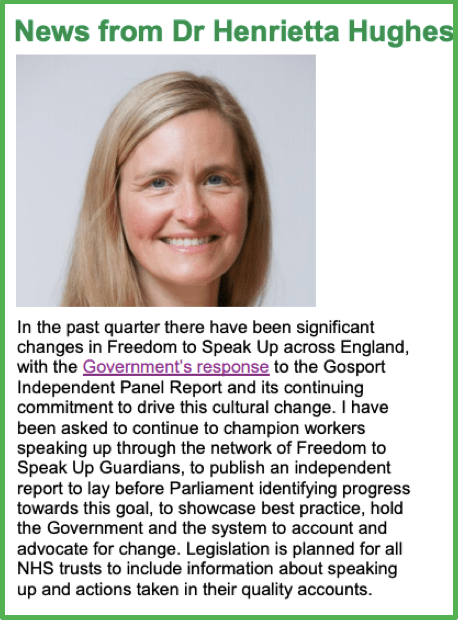
Who asked her to lay this report before parliament?
Parliament initially denied any contact with the National Guardian. When I pointed out that the National Guardian has had meetings with Sarah Wollaston MP Chair of the Health and Social Care Committee, parliament conceded that Henrietta Hughes and Sarah had met on three occasions: 14 September 2016, 13 March 2017 and 6 November 2018.
The House of Commons has made these comments about whether Select Committees and their members are subject to FOIA:
“The Committee Office, made up of clerks, committee assistants, committee specialists etc., is part of the House of Commons, and it is the information held by the Committee Office that we check when a request under the Freedom of Information Act 2000 (FOIA) is made.
The Committees themselves are made up of individual Members of Parliament, who are NOT public authorities in accordance with the FOIA. Any information that Members hold ‘personally’ – for example, their own personal notes or diary arrangements – is out of scope for the purpose of the FOIA.
Finally, Committee Chairs sit somewhere in the middle. The work they do in the Committee with other Members falls within the scope of what the House holds. However, they may also choose to carry out work, attend meetings or conduct research in their capacity as the Chair but not on behalf of, or under instructions from, the Committee. Some of this work may be supported by the Committee Office, in which case the Committee Office may hold information about it. When working independently in this manner, Committee Chairs may also choose to share details with the Committee Office, but they are not obliged to do so.”
I asked Sarah Wollaston on 2 March 2019 if she would be willing to disclose the records of her three meetings with the National Guardian, and await an answer.
The Department of Health and Social Care was also asked for records of any communications with the National Guardian about the proposed report for parliament. The Department is overdue in its response. It has so far confirmed that it holds the data requested, but is currently considering whether an exemption applies under Section 35(1)(a) FOIA – formulation of government policy. Or in other words, the government is likely to be embarrassed if the PR manufacturing process is revealed.
The Department of Health and spin about the 2009 Gosport inquests
In 2009, inquests into ten suspicious deaths at Gosport War Memorial Hospital resulted in findings that all ten were deaths from natural causes, and that where medication was considered to have contributed more than minimally or negligibly to five of the deaths, it had been given for therapeutic purposes in all five cases. In three cases – Elsie Devine, Robert Wilson and Geoffrey Packman, the inquest concluded that although medication had been given for therapeutic purposes, it had not been appropriate to the symptoms or conditions which the deceased had been suffering. See archive document CPS000047 for the inquest jury verdicts.
This must have astonished some, including the Chief Medical Officer’s team, who assumed that the coroner would find unlawful killing:

The Gosport Independent Panel investigation led by Bishop James Jones has since concluded that there were hundreds of deaths due to deliberate, inappropriate and clinically unjustified use of lethal levels of opiates:
“12.10 The Panel’s analysis therefore demonstrates that the lives of over 450 people were shortened as a direct result of the pattern of prescribing and administering opioids that had become the norm at the hospital, and that probably at least another 200 patients were similarly affected.”
Many staff at Gosport had expressed concern about these practices to their managers and or to the police, about what the Gosport Independent panel inquiry euphemistically termed as “shortening lives”. Some staff voiced concerns to the police about euthanasia or deliberate killing to keep waiting lists down.
Alarmingly, there was intense news management by the NHS authorities in the months before the 2009 inquest hearings. Documents in the Gosport Independent Panel’s archives reveal considerable resources were marshalled to limit reputational damage. Trimedia, a PR firm, was hired to help manage the news about the 2009 inquest. Trimedia had been hired by the Department of Health in preceding years, as revealed by a parliamentary question in November 2008.
This news management was barely reported by the Gosport Independent Panel, although the Panel’s report devoted a chapter to “The local and National media”. The Panel’s chapter about the media largely covers what was reported by the media, and not how the authorities tried to manipulate the media.
A search of the Panel’s inquiry report produces zero hits for
“public relations”
“media relations”
or “Trimedia”
The Department of Health had previously guided and dog whistled spin about the Gosport deaths.
For example, internal 2002 DH correspondence shows deliberations by DH comms after the Strategic Health Authority contacted the Department for advice, in relation to an enquiry from a Sunday Times journalist.
Archive document DOH000398 showed that the Strategic Health Authority had a standard form for reporting media alerts to the Department of Health, which included a box entitled: ‘Information about lines to take’.
A 2003 Strategic Health Authority document on “lines to take” on the Gosport deaths showed that the SHA was reporting back to the Department of Health on detailed planning around a File on Four broadcast.
A related, “strictly confidential” SHA email discusses further action in response to the File on Four broadcast. This includes the comment: “…no plans to dripfeed at present”.
2006 internal Department of Health correspondence revealed an instruction to the Strategic Health Authority (SHA) to construct a comms strategy on Gosport:
“Is the SHA on top of this?”
“Push them for a comms strategy please”
In 2009, the Department of Health wanted to be kept abreast “in the run up to, during and after the inquest”.
I collate below some of the archive documents which reveal the collusion and news management by NHS bodies regarding the 2009 Gosport inquest hearings.
Document DOH700711 (supplied by the Department of Health):
This was correspondence by Richard Samuels Hampshire PCT Director of Corporate affairs, which reveals the confidential, key aims of a multiagency steering group to handle the inquests. It includes an intention to “preserve the reputation of local NHS services”:
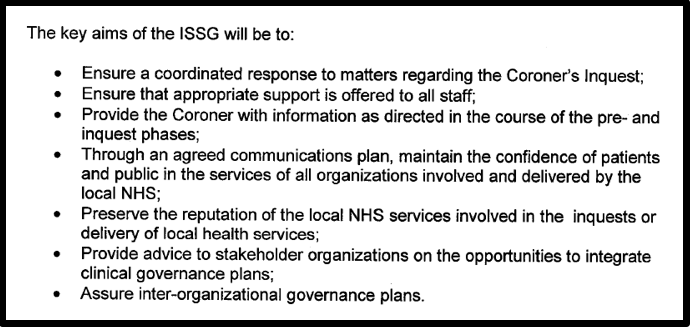
Importantly, this document notes that the steering group was to report regularly to the Strategic Health Authority:

A media management ‘action plan’ of January 2009, which reveals the scale of planning and multiagency coordination, complete with plans for photo opportunities:
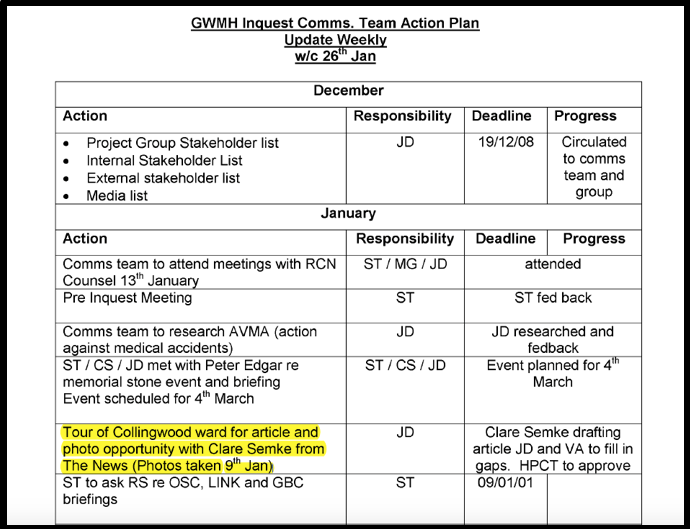
Document SOH100588 (supplied by Southern Health NHS Foundation Trust):
This lists 32 individuals who were part of the “GWMH inquest project group”, including personnel from the law firm Mills and Reeve, Hampshire PCT comms team, Trimedia PR consultants, Portsmouth Hospitals NHS Trust staff and its comms team, Portsmouth City Teaching PCT and Hampshire Partnership Trust.
This was a “GWMH inquests – Communications Protocol Pack”. This document states that a “proactive approach” to the media would be coordinated.
Document DOH700738 (supplied by the Department of Health):
This records that Trimedia (represented by Julie Dean and Caroline Searle) and Mills and Reeve solicitors set to work on the inquest in October 2008, some six months before the inquest hearings were held.
A trade union, the RCN, was represented in the process. According to this document, Betty Woodland (BW) RCN Lead Steward brought along disclosure papers from one of the original Gosport whistleblowers, Sylvia Giffin.
Another related archive document, MRE000701,listed the RCN members who would be giving evidence to the inquests.
Document PHO103758 (supplied by Portsmouth Hospitals NHS Trust):
This documents sets out the following strategic aims for the multiagency comms plan:

Document DOH700718 (supplied by the Department of Health):
This was a briefing by Trimedia for NHS managers on a meeting with BBC journalists on 2 March 2009. The action plan generated includes a pre-recorded interview in advance of the inquest verdicts:
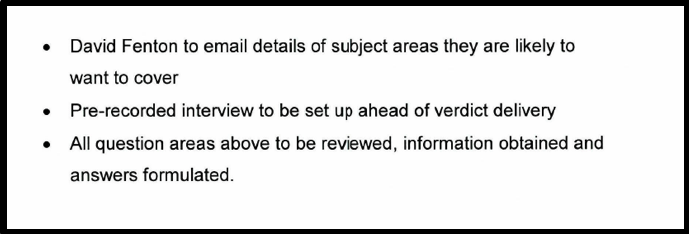
Document MRE000782 (supplied by Mills and Reeve):
This document revealed some tactical considerations regarding the inquests and it discussed methods for bringing the media ‘onside’:

Document DOH101771 (supplied by the Department of Health):
This document noted that a media tour of the hospital had been arranged as planned, for three BBC journalists, with support from Trimedia:

The same document revealed steering group discussions about ‘vulnerable areas’ at inquest, and the need for additional cover from Trimedia on days when Dr Jane Barton and Gill Hamblin were giving evidence:

Document SOH001158 (supplied by Southern Health NHS Foundation):
Minutes of an inquest steering group meeting noted that “positive stories” were being fed to the media.

Document MRE000244 (supplied by Mills and Reeve solicitors):
This showed how the different organisations worked together to get a single story which could be presented to the coroner:

The inquest steering group sought to defend events at Gosport by advancing an argument that what happened was ‘common practice’:

The document also showed that a witness statement by Lesley Humphreys, formerly Quality Manager and later Operations Manager was crafted by committee:

This document additionally shows how Lesley Humphreys’ statement was developed, and that the Strategic Health Authority was involved.
Document DOH700721 (supplied by the Department of Health):
This was the confidential media spokesperson pack generated by the steering group, which included a list of “key words” that were important in crafting the right messages:
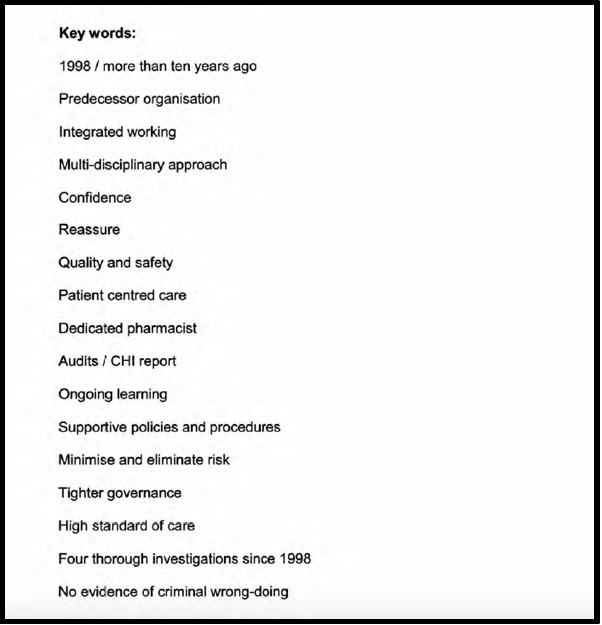
Parts of this document are redacted, so who knows what other objectionable material lurked within.
Document MRE001669 (supplied by Mills and Reeve solicitors):
This was a briefing pack for NHS staff who were scheduled to give evidence at the inquests. It included a media statement, showing the direction of organisational spin:
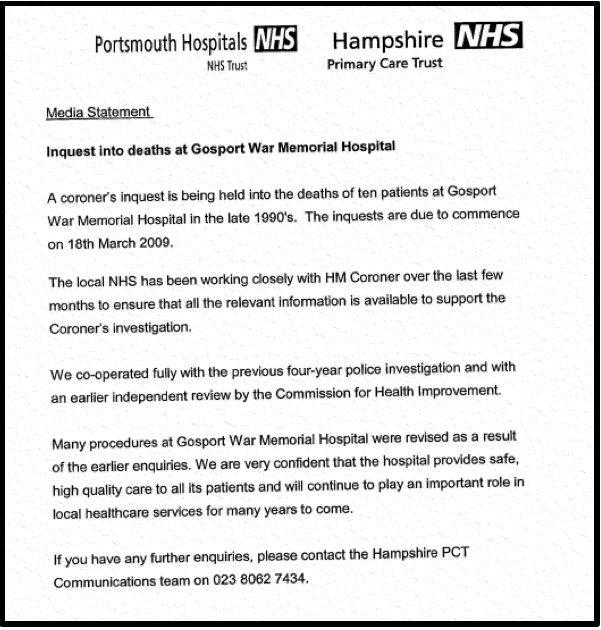
This included discussion of whether, in the context of the comms strategy, there was any conflict between the interests of NHS bodies and the doctors or the NMC.

Document MRE000233 (supplied by Mills and Reeve solicitors):
This refers to preparation of a coordinated approach, to ‘counter’ police expert witness evidence:

This document also reveals an intent to coordinate what media line Dr Jane Barton’s lawyers and the NHS authorities would take on her management:

Last but not least, there is an email trail in the archives that appears to show Dr Jane Barton’s direct involvement in the inquest preparations, and communications between her medical practice and the Trimedia public relations firm:
Document FMC000058, supplied by Forton Medical Practice:

So there you have it, a continuous thread running from Jane Barton all the way up to the Department of Health.
A later document showed that Trimedia staff were still involved in August 2009, regarding briefing about Dr Jane Barton’s Fitness to Practice proceedings at the GMC.
One wonders if given these industrial levels of official manipulation, the forthcoming network of medical examiners which will be under the control of the NHS has much of a chance.
The Bishop hardly commented in his Panel report on the news management by the NHS.
The only sections of the Panel’s report I could find which cited the above documents were these:
|
“8.119 Despite hoping that the Coroner would not issue a Rule 43 letter, the Trust was keen to ensure that, pursuant to Rule 43, some evidence was heard during the course of the inquests about the present state of the hospital and how things had improved. In July 2008, an inquest ‘steering group’ was set up with the aim of managing the “Coroner’s inquests effectively in order to maintain the continuity, quality and confidence of local people in health services in Gosport” (MRE000260, p1). The steering group met on a number of occasions and received input from the solicitor for the Trust. The topics discussed at meetings included the approach of the Coroner to the inquests (MRE000647, p2), the communication strategy (MRE000244, pp1–2) and the best approach to addressing, through evidence, any potential Rule 43 issues (MRE000244).” “4.90 Correspondence in the period between 2008 and March 2009 shows that Portsmouth Hospitals NHS Trust and Hampshire PCT were focused largely on preparations for relevant inquests (DOH602073, DOH602082, MRE000782, MRE000780, DOH603144, MRE000211, MRE001459, MRE001646, MRE001678, MRE001638, MRE001615, MRE001600). Although the correspondence refers to some relevant matters in passing, there is no evidence that consideration was given to any further investigation of previous clinical failures at the hospital or the mishandling of the nurses’ concerns. The GMC and the Coroner continued to take action, and this is covered in later chapters.”
|
Neither did Tom Kark address the toxic role of the Department of Health in driving poor culture in his recent FPPR report. This was despite his acknowledgment of the Department’s role in his previous capacity as Counsel to the MidStaffs Public Inquiry.
But their reticence does emphasise that reviews and investigations under the umbrella of conflicted government departments are hardly likely to reveal everything.
For effective whistleblowing governance and public protection, nothing less than a fully independent statutory body that reports to parliament and not governments, will do.
UPDATE 31 MARCH 2019
Continuing government spin about the Gosport deaths disaster was revealed by a Department of Health and Social Care FOI disclosure of 27 March 2019. The government and the National Guardian’s Office has been working closely to polish the government’s image on Gosport, including by spinning a “positive narrative”.
Spinning Death at Gosport II: DHSC FOI revelations & National Guardian’s fake independence
RELATED ITEMS
Southern Health Foundation NHS Trust was one of the successor bodies of Hampshire PCT, and took over Gosport War Memorial Hospital. Southern Health carried on the tradition of neglect by failing to investigate hundreds of deaths of mental health patients.
Katrina Percy, the much criticised chief executive of Southern Health NHS Foundation Trust was involved in the aftermath of the Gosport deaths. For example, this is a letter by Percy to the NMC, which traces the subsequent movements of the nurses involved in the Gosport affair: Document NMC100113
Gosport archive document FMC000051: the business card of Julie Dean Trimedia senior consultant, supplied to the Gosport Independent Panel by Dr Jane Barton’s medical practice:
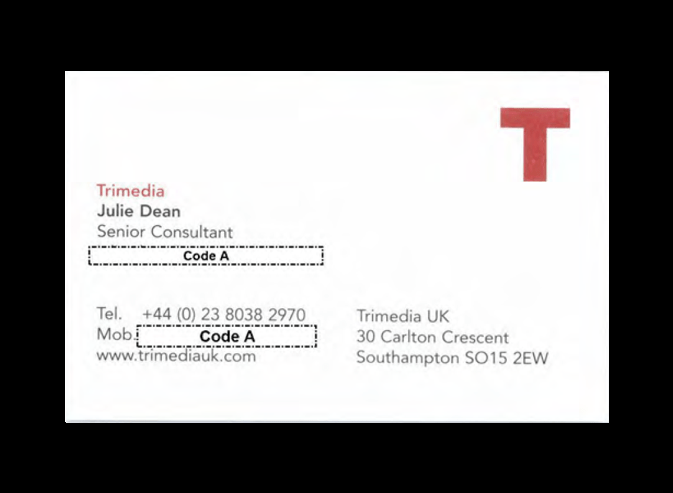
Evidence to parliament about the Kark FPPR Review
What could a new whistleblowing law look like? A discussion document


No comment of mine could do justice to the width and depth of your research, Dr A, but I do thank you.
Nevertheless, consulting my ‘Mexican Model,’ I note that some people will do anything for money. They will commit any atrocity, cover up atrocities and ensure that the innocent are crushed into submission if not eliminated.
I think the NHS began as a body charged with doing good. How quaintly old fashioned that concept seems today!
Thank you. And, please take care.
Kindest, Z.
LikeLike